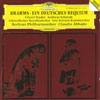Brahms German Requiem
View record and artist detailsRecord and Artist Details
Composer or Director: Johannes Brahms
Genre:
Vocal
Label: DG
Magazine Review Date: 5/1993
Media Format: CD or Download
Media Runtime: 74
Mastering:
Stereo
DDD
Catalogue Number: 437 517-2GH

Tracks:
| Composition | Artist Credit |
|---|---|
| (Ein) Deutsches Requiem, 'German Requiem' |
Johannes Brahms, Composer
(Eric) Ericson Chamber Choir Andreas Schmidt, Baritone Berlin Philharmonic Orchestra Cheryl Studer, Soprano Claudio Abbado, Conductor Johannes Brahms, Composer Swedish Radio Chorus |
Author:
The most comforting of Requiems has here the most genial of performances. To take the soloists as a first example: there is Andreas Schmidt, firm of voice, ample of range, his tone as finely textured as ever (indeed, more so than in the DG recording with Giulini five years earler), and here is Cheryl Studer, her voice pure and even, her breath supporting the great span of phrases with no more sign of effort than is betrayed by stone pillars holding aloft a broad fan-vaulted roof. The baritone sings of man's mortality and the soprano of human sorrow whose bearer will be comforted ''as one whom his mother comforteth''. The first might, one would think, be disturbed a little by the awesomeness of his text, just as the second might be touched by the compassion inherent in hers; but whatever these two singers were feeling at the time remains private, for they are content to sing well, and we evidently must be content with that.
Abbado himself is a little more communicative, and rather like the soloists he sees to it that the performance is faithful and distinguished in the excellence of its resources. But again there are limitations. Take the shortest and most famous of the choruses, No. 5 (''Wie lieblich sind deine Wohnungen''). It is a lyrical expression of blessedness, rarely abandoning its major-key tonality, quite beautiful and by no means merely bland in this new recording. Try comparisons, however: both Hickox (Chandos) and Gardiner (Philips) take it slightly faster, with gains in cohesion of phrase and life of rhythm, and where the lyricism is varied with pizzicato and sforzando these are given sharper point, Gardiner especially making them dancelike, suggestive of a spiritual excitement in the courts of the Lord. Throughout the work, comparison with Hickox has an awakening effect, and with Gardiner the wakefulness becomes positively alert. In both of these other recordings the chorus's words are rather clearer, though all three suffer in some degree from the habitual relegation of chorus to an insufficiently prominent place in the balance.
Always Gardiner is the man for the revelations; also with him we listen more from the 'thither' side, historically (kinship with Bach, for instance, and in his notes Anthony Burton suggests Schutz too). By comparison there is nothing very stimulating about this new recording; a fine performance in many ways, free of portentousness or exaggeration, but, in the present state of choice, not serving any very pressing need.'
Abbado himself is a little more communicative, and rather like the soloists he sees to it that the performance is faithful and distinguished in the excellence of its resources. But again there are limitations. Take the shortest and most famous of the choruses, No. 5 (''Wie lieblich sind deine Wohnungen''). It is a lyrical expression of blessedness, rarely abandoning its major-key tonality, quite beautiful and by no means merely bland in this new recording. Try comparisons, however: both Hickox (Chandos) and Gardiner (Philips) take it slightly faster, with gains in cohesion of phrase and life of rhythm, and where the lyricism is varied with pizzicato and sforzando these are given sharper point, Gardiner especially making them dancelike, suggestive of a spiritual excitement in the courts of the Lord. Throughout the work, comparison with Hickox has an awakening effect, and with Gardiner the wakefulness becomes positively alert. In both of these other recordings the chorus's words are rather clearer, though all three suffer in some degree from the habitual relegation of chorus to an insufficiently prominent place in the balance.
Always Gardiner is the man for the revelations; also with him we listen more from the 'thither' side, historically (kinship with Bach, for instance, and in his notes Anthony Burton suggests Schutz too). By comparison there is nothing very stimulating about this new recording; a fine performance in many ways, free of portentousness or exaggeration, but, in the present state of choice, not serving any very pressing need.'
Discover the world's largest classical music catalogue with Presto Music.

Gramophone Digital Club
- Digital Edition
- Digital Archive
- Reviews Database
- Full website access
From £8.75 / month
Subscribe
Gramophone Full Club
- Print Edition
- Digital Edition
- Digital Archive
- Reviews Database
- Full website access
From £11.00 / month
Subscribe
If you are a library, university or other organisation that would be interested in an institutional subscription to Gramophone please click here for further information.




